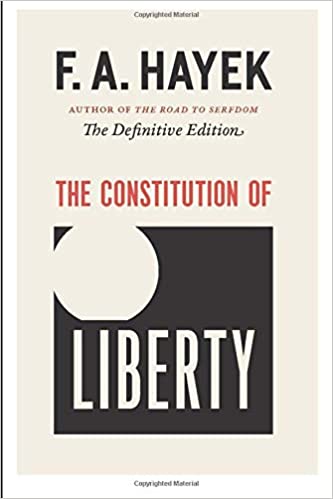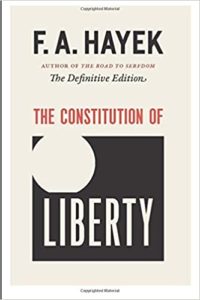

Maybe you “didn’t build that” entirely on your own, but if you act as if you did, you probably will build more.
It is often contended that the belief that a person is solely responsible for his own fate is held only by the successful. This in itself is not so unacceptable as its underlying suggestion, which is that people hold this belief because they have been successful. I, for one, am inclined to think that the connection is the other way round and that people often are successful because they hold this belief. Though a man’s conviction that all he achieves is due solely to his exertions, skill, and intelligence may be largely false, it is apt to have the most beneficial effects on his energy and circumspection. And if the smug pride of the successful is often intolerable and offensive, the belief that success depends wholly on him is probably the pragmatically most effective incentive to successful action; whereas the more a man indulges in the propensity to blame others or circumstances for his failures, the more disgruntled and ineffective he tends to become.
This is from Friedrich Hayek, The Constitution of Liberty, 1960, Chapter 5, “Responsibility and Freedom.” It’s one of my favorite passages.
A related one is my justification for cheerfulness and optimism. Both John Stossel and Robert Higgs have asked me why I’m so cheery and optimistic. Part of my answer is that it helps me get out of bed every morning and motivates me to work toward my personal and political goals. My optimism probably is not entirely justified. But it motivates me and probably helps me make the world a slightly better place.
Additional note: This is the other part of my answer to John Stossel. It doesn’t relate directly to the Hayek point though.
HT2 Dan Klein.

READER COMMENTS
KevinDC
Nov 8 2021 at 9:56pm
This reminds me of an inverse observation made by Eric Hoffer in The Passionate State of Mind. Hayek observes that a belief that your fate is ultimately in your hands is one which motivates people to behavior which promotes success. Hoffer, on the other hand, observed that some people would embrace defeatism as a justification for not making an effort. In his words:
David Henderson
Nov 8 2021 at 10:01pm
Great quote. Thanks.
Related to that, many of my young economist friends often quote Michael Munger’s question, “Why aren’t you writing?” They seem to find it motivational. But I believe in the power of words. Our subconscious works in very logical ways. My concern is that asking someone why he’s not writing will lead him to give his reasons for not writing. I think a better question is, “What can I do today to make sure I’m writing?”
Jon Murphy
Nov 9 2021 at 5:45am
I implicitly use your second question to motivate myself. Using Munger’s made me feel guilty about non-writing time (eg research, reading, or leisure). Since I don’t like feeling guilty, I would end up doing a bunch of nonsense to avoid guilt rather than produce.
But you told me once about how writing 300-500 words a day leads to roughly a paper a month. That motivates me to write and not feel guilty about non-writing time. My productivity has skyrocketed.
David Henderson
Nov 9 2021 at 12:43pm
I’m glad that’s working, Jon. Thanks for the feedback.
Ryan M
Nov 9 2021 at 9:57am
There is certainly value in writing for its own sake (in my case, it is often little more than venting frustrations). However, the world of writing can be exceedingly discouraging, especially if you ever make any sort of honest attempt at publishing.
I suppose one might argue that there is value in talking, even if you’re only talking to yourself … but I’m not certain that is true.
There have been a great many comments on websites like this one, where 2 or 3 paragraphs in, I’ll just delete the whole thing, thinking: “what do I expect to come out of this?”
rsm
Nov 8 2021 at 11:07pm
So, capitalism rewards liars who take credit for work done by the disgruntled?
Mike Hammock
Nov 9 2021 at 8:46am
Is there anything in this post that wouldn’t also apply to someone living in, say, a centrally planned economy? Presumably such a person would also have to find a reason to get out of bed in the morning and be productive, and it’s possible that a similar frame of mind would be similarly helpful.
Ryan M
Nov 9 2021 at 10:04am
I think you miss the point. Or maybe I am the one missing the point. I don’t believe it is the “smugness” or the obnoxious self-aggrandizement that Hayek is praising, though admittedly he doesn’t make it absolutely clear. If a person holds the view that in order for something to be done, he must work to accomplish that thing, it is far more likely that he will in fact work to accomplish something. That doesn’t mean that this person must necessarily lack gratitude and humility, or be unable to recognize the efforts of others. But it does mean that the person doesn’t sit back and expect that his own efforts are somehow futile or unnecessary. Take, for instance, a leader who charges a group into battle (just as an analogy); surely, that leader doesn’t believe that he is solely responsible for the outcome, but he may be thinking “if I don’t do this, it may not happen” as he gets out in front and leads the charge. That is the sort of mindset Hayek’s quote makes me think of; capitalism encouraging individual action, rather than capitalism bringing out the worst of human pride.
Dylan
Nov 9 2021 at 9:32am
Thanks for posting this. I’ve only read a little bit of Hayek and had never come across it before and find that it nicely encapsulates the direction my views have evolved in, particularly this single line:
I’ve found that puts me in an awkward position in most groups, because I believe in a kind of soft determinism where the characteristics that are correlated to success are not really of ones choosing; how intelligent you are, the family you’re born into, even your work ethic are essentially assigned by chance. Yet, I think incentives are incredibly important, and the belief that one is master of their own destiny, even if largely false, is important to making incentives matter. This often leaves me of mixed opinions when it comes to policy prescriptions as I look to balance efficiency concerns with fairness.
Floccina
Nov 9 2021 at 10:34am
An interesting thing about the likes of Nikole Hannah-Jones, is that they put a huge amount of weight on privileged circumstances and very little on incentive and motivation. They see those with good and rich parents as having an insurmountable advantage over the child of a poor parents who is motivated by his relatively low circumstances want to succeed beyond the pampered rich and show them he is better.
David Seltzer
Nov 9 2021 at 12:57pm
Really interesting. I was competing for a place on the Navy boxing team, 1960. When I was knocked down during sparring sessions, my coach, Aviation Boatswains Mate First Class Carter, immediately said…”It’s you fault. How are you going to fix it?” I loved fighting but that wasn’t enough. I had to get better and that meant, training harder and smarter. Being a trained fighter meant taking the measure of myself, having flaws exposed and developing the mindset necessary for success. It may be true that one’s fate is partially determined by biology and and environmental factors but it is also true that the will to succeed means nothing without the will to work.
Ken Costello
Nov 9 2021 at 1:33pm
Regarding wokeism, I see a major repercussion as people who aren’t real successful using the excuse that society is marginalizing them because they fall within a particular group. They then see themselves as victims and don’t have to take responsibility for their decisions and behavior. They blame their fate largely on factors beyond their control, rather than looking within themselves to see how they can change their behavior to become more successful. Sure, there are those who aren’t doing real well because of bad luck and other things that they have little control over. But it seems to me that wokeism will keep more people down, as well as justifying the forced take away of wealth from successful (so-called privileged) folks who work hard and earn what they have by producing something of value to society. The overall effect is to reduce economic growth and society’s well-being and, in the process, keep more people in poverty. If wokeism doesn’t die a quick death, we may see its long-lasting effect on our institutions –we have already seem its beginning effects.
Monte
Nov 9 2021 at 2:46pm
Toxic Positivity (TP) could be at the root of your optimism. TP is an obsession with positive thinking. It is the belief that people should put a positive spin on all experiences, even those that are profoundly tragic. Not only can it be harmful to those suffering from it, according to https://www.medicalnewstoday.com/articles/toxic-positivity, it is annoying to those we encourage to “cheer up.”
Monte
Nov 9 2021 at 2:49pm
Links above broken. Try these:
https://www.medicalnewstoday.com/articles/toxic-positivity
https://www.wsj.com/articles/tired-of-being-told-cheer-up-the-problem-of-toxic-positivity-11635858001
David Henderson
Nov 9 2021 at 2:59pm
For the record, Monte, I haven’t told anyone to “cheer up” in approximately 50 years. Having a brother commit suicide 51 years ago caused me to be a listener when people have pain.
Monte
Nov 9 2021 at 3:56pm
I’m so sorry to hear about your brother, David. I posted this tongue-in-cheek hoping for a few laughs, but I sometimes fail to take things more seriously than I should. I also lost my brother 38 years ago to a tragic accident and I feel your pain.
“Some things cannot be fixed, they can only be carried.” – Anonymous
David Henderson
Nov 9 2021 at 4:43pm
Thanks, Monte. I guess that’s the problem with humor on line when you don’t know the person. I’m sorry about your brother.
Ryan M
Nov 9 2021 at 4:33pm
There is a lot wrong with the medical profession these days. There is a lot more that is wrong with the psychological profession (and worst of all is when the two intersect). It is very often not simply a case of blind leading the blind, but arrogant blind leading the blind… It says something about a person’s worldview and philosophy who comes up with – in all seriousness – the notion of “toxic positivity.”
nobody.really
Nov 11 2021 at 12:51am
A not uncommon perspective. “For myself I am an optimist — it does not seem to be much use being anything else.” Winston Churchill, Lord Mayor’s Banquet, Guildhall, London (9 November 1954) The Unwritten Alliance, Columbia University, NY (1966), at 195.
This raises a number of questions.
1: Should we strive hold beliefs that are useful, or that are accurate? And, if useful, by what standard should we measure utility? If MLK could have had lived longer and earned more money by ignoring racial discrimination, would Henderson have commended such a life path to him?
2: Does Henderson embrace religion? If so, does he do so because it’s useful, or because he actually believes in it? If not, if he could be persuaded that embracing a faith would be useful, would he change his beliefs?
Comments are closed.